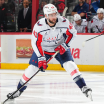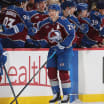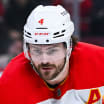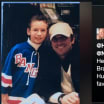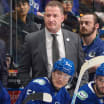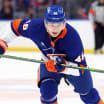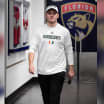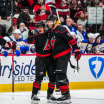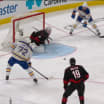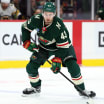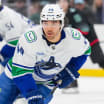There is a future to be considered for the Boston Bruins, with a sudden abundance of prospects and rookies, from Charlie McAvoy to Jake DeBrusk to Danton Heinen to Ryan Donato to Jakob Forsbacka Karlsson to Trent Frederic, and a sense that good times are ahead in Boston.
Nash trade moves bar higher for Bruins
Boston improves Stanley Cup chances by adding forward
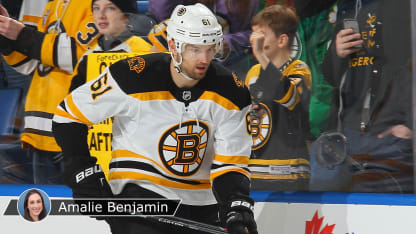
But there is also the present, and this is a present that cannot be discounted. This is a present when the Bruins have a rejuvenated Zdeno Chara and a Hart Trophy-candidate level Patrice Bergeron, a present with a core that already has the experience of winning a Stanley Cup in 2011, a present when the team unexpectedly finds itself near the top of the NHL standings. The Bruins (37-15-8) are in third place in the Atlantic Divsion, one point behind the Toronto Maple Leafs with four games in hand, and five behind the Tampa Bay Lightning with two games in hand.
That is why the Bruins traded for New York Rangers forward Rick Nash, a former 40-goal scorer, on Sunday. To get Nash, the Bruins shipped out forwards Ryan Spooner and Matt Beleskey, the latter of whom was in the American Hockey League, along with defenseman prospect Ryan Lindgren, a first-round pick in the 2018 NHL Draft and a seventh-round pick in the 2019 NHL Draft.
Related: [Bruins acquire Rick Nash | Gionta signed by Bruins]
The rental of Nash, who can become an unrestricted free agent on July 1, did not come cheap.
But the Bruins felt they needed a boost, and needed a boost in a season in which they should truly contend for the Stanley Cup. They have veteran talent and leadership, from Chara and Bergeron and David Backes and Torey Krug. They have eager rookies. They have the ability to score - they were tied for fourth in the NHL at 3.24 goals per game entering Sunday -- and now, with Nash, have the depth of three true scoring lines.
The move counters the Pittsburgh Penguins' acquisition of center Derick Brassard from the Ottawa Senators on Friday, and possibly anything the Lightning and Maple Leafs might do before the 2018 NHL Trade Deadline (Monday, 3 p.m.).
"We came to the ultimate decision that, to improve our hockey club, this was the direction we were going to go," said general manager Don Sweeney, who also signed veteran forward Brian Gionta, fresh off his stint as captain of the United States men's hockey team at the 2018 PyeongChang Olympics to a one-year contract worth $700,000. "We hope [Nash] will be the impact player he has been. We've identified that playing on that second line with David [Krejci] would be a boost to our hockey club, and we need it to be."
It was a complicated deal that came together Sunday morning, Sweeney said. But it was the right deal, giving the team the ability to put a bigger wing alongside Krejci, a situation that has helped the center succeed in the past with players like Milan Lucic, Nathan Horton and Jarome Iginla.
"I just think that Rick Nash brings a little different dimension to that line, in puck protection and the ability to get to the hard areas when really the season becomes even harder to get there," Sweeney said. "Hopefully David will have some juice as a result of this, and that line will find a way to finish a few more goals and, more importantly, continue to play well defensively, which Rick has played well in the past."
One of the problem areas for the Bruins had been that second line, where Nash started as the right wing to Krejci, along with DeBrusk, against the Sabres on Sunday. And while Sweeney emphasized he still believed in Spooner and his ability to play the wing, it never quite worked in Boston. He was valuable as a piece on the power play, but had not been able to help the second line become the right complement to the high-powered first line of Bergeron, Brad Marchand, and David Pastrnak.
Nash, who brings that size (6-foot-4, 211 pounds) and the ability to play in all areas of the game, including Boston's top power-play unit, will be a different type of player, adding bulk to a lineup that generally does not have it outside of the fourth line.
"We expect him to make us a better team -- a bigger forward that was lacking some nights for us," Cassidy said. "A more proven scorer. We have some young kids in the lineup that still have not been battle tested. We don't know how that will play out. … He gives us a proven commodity."
It's a situation that works for Nash, who said that Boston was at the top of the trade list he submitted to the Rangers.
"I wanted to go to a place that wanted me and a place that had a great chance to win," Nash said. "I think Boston fits both those perfectly."
Because the bar has been raised this season. At the start of the season, the Bruins had appeared to be a team that might contend for a wild card. Instead, the Bruins have been perhaps the best team in the NHL over the past few months, going 22-4-4 in their last 30 games.
But there is a difficult road ahead. The Bruins appear likely to have to get through the Maple Leafs and the Lightning to reach the Eastern Conference Final, no small task.
This roster, though, could get them there. The Bruins braintrust had talked recently about not wanting to upset the chemistry that Boston has built this season, not wanting to get in the way of what had become a good thing. Nash doesn't want to do that either. He said to combat that he will try to be himself, to work within the group the Bruins have, to fit.
He senses that, if it all works, there could be a great reward.
"I've only been here for five minutes and you can kind of sense that buzz and that excitement, the energy that a winning team has," said Nash, who didn't register a point in the Bruins' 4-1 loss to the Sabres on Sunday.
So they had to load up. They had to make the deal.
"It sends a message that management feels that we're a good hockey team, and he's going to make us better," Cassidy said. "Where that leads, you can only speculate."
